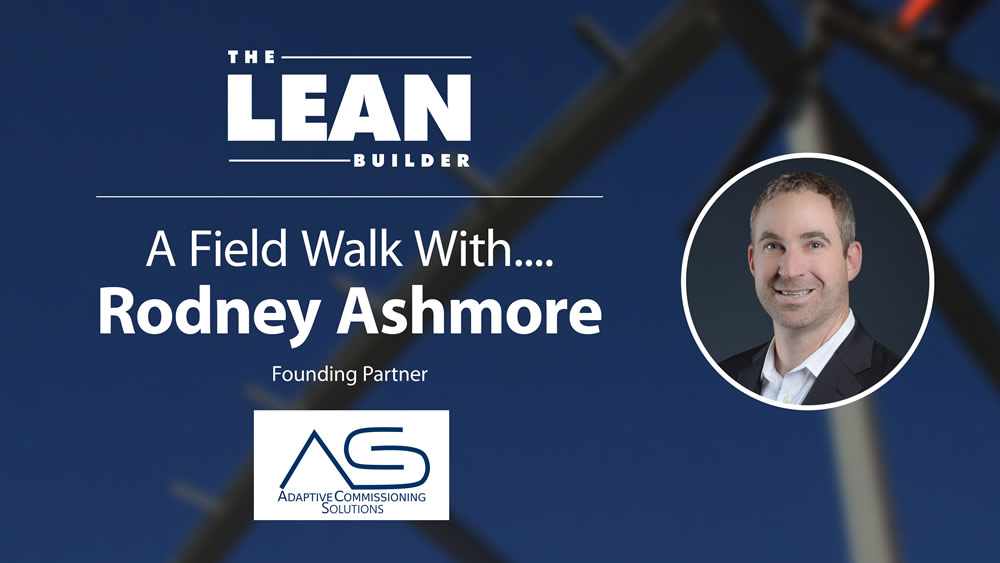This week we talk with Rodney Ashmore, CxA, Founding Partner with Adaptive Commissioning Solutions in Dallas, Texas.
“A Field Walk” is a Q&A-style series that features Lean practitioners sharing insights on their journey as well as advice on securing buy-in, tips for implementation, and more. As our community is built for shared learning, we trust you’ll find value from reading about their experience and examples.
A Field Walk with Rodney Ashmore
Was there a specific reason or event that got you started on your Lean journey?
I started Lean with my initial experience of joining a pull planning meeting, which left a lasting impression on me. Witnessing the effectiveness of working backwards from the end date to the present was truly remarkable, especially in the context of commissioning projects. The structured and strategic approach of Lean, where every step is meticulously planned and executed to optimize efficiency, aligns perfectly with my belief in systematic and results-driven methodologies. It’s clear to me that Lean offers a powerful framework that can revolutionize commissioning processes and enhance project outcomes.
Why do you think many in our industry are resistant to Lean culture?
I feel that a lot of people in the industry believe that Lean is riddled with extra effort. Companies today try to complete tasks, finish up projects, and go home. With a little bit of effort in the front end, it helps to align companies and make for a better product with an easier timeline in the end.
Do you think Lean can be practiced on projects without the major trades and/or GC buy-in?
I pride myself on implementing Lean strategies with our commissioning process on each project that I am placed into. With the project team being part of the commissioning process, they are there to witness the Lean Commissioning values and opportunities and are able to voice their concerns and opinions within the desired scope being presented.
Do you think Lean can be practiced on projects without the Owner and/or design team buy-in?
I personally have been on several projects where the owner and design team were not bought into the process, and still, the Lean processes were completed with the trade partners, GCs, and commissioning. Often, the facilities personnel who are in the turnover process of the project are bought in from the effort of the commissioning turnover with Lean procedures.
How do you convince trade partners or other superintendents who are resistant to change to try something new?
I don’t often have to work on superintendents to follow the Lean principles, but by showing respect and opportunities within the Lean processes, I can help guide the trade partners into understanding and participating in the Lean commissioning goals.
What Lean process, tool, or methodology has been a game changer to the way you run work in the field?
Utilizing the “Plus/Delta” approach in our commissioning process through Lean principles has significantly enhanced our project execution within the construction field. “Plus/Delta” has empowered us to continually improve and refine our commissioning methods by focusing on the positives (Plus) and areas for growth (Delta).
During our interactions with subcontractors, the Plus/Delta method allows us to acknowledge and reinforce successful strategies, collaboration, and achievements (Plus). This positive reinforcement fosters a culture of continuous improvement, encouraging teams to replicate successful approaches and build on them. Simultaneously, identifying and addressing areas that require enhancement or adjustment (Delta) ensures that we learn from our experiences and iterate on our processes to drive efficiency and effectiveness in future projects. Ultimately, this holistic approach aids in fostering stronger collaboration and more streamlined operations with our subcontractors, ultimately leading to better project outcomes.
For superintendents or trade partners that are new to Lean, where should they start?
The best place to begin with the implementation of Lean is the morning huddle meeting. They will understand what is going on through all aspects of the project for that day, place themselves in a better relationship with people that are around them working, and get a better understanding of the impact that the team is making on the project or building they are working on.
Starting with the huddle meeting is the easiest place for people to fit in and share what they are working on and express any concerns, issues, or positive feedback they might have for the team.
What is the single most important value achieved from Lean?
For me, as a Commissioning Agent, it is respect—a fundamental aspect ingrained in Lean processes— that has played a pivotal role in enhancing my commissioning efforts within the field. The acknowledgment and respect for my position and expertise from colleagues and team members have created a supportive environment where my contributions are valued, and my recommendations are taken seriously. This level of respect fosters effective communication and collaboration, enabling me to articulate my ideas, propose improvements, and implement streamlined commissioning strategies with confidence and authority.
When respect is mutual and deeply rooted within the Lean philosophy, it significantly boosts teamwork, commitment, and overall project success. In turn, this level of esteem fuels my motivation to do an even better job, knowing that my insights and efforts are respected and contribute positively to the project’s objectives.
Do you think Lean should/can be practiced on all/most projects? If not, what percent do you think it can be effective?
Lean methodologies should be adopted across all projects, especially in the context of commissioning efforts, due to the transformative benefits Lean brings to the table. The fundamental principles of Lean align seamlessly with the objectives of commissioning. By incorporating Lean practices into commissioning workflows, we can systematically identify and eliminate inefficiencies, ensuring that resources are utilized judiciously, time is managed effectively, and costs are minimized—all critical aspects of successful commissioning. The emphasis on collaboration, communication, and empowering frontline workers within the Lean framework harmonizes perfectly with the cross-disciplinary nature of commissioning efforts.
In essence, Lean practices enhance the commissioning process by promoting a culture of efficiency, excellence, and ongoing advancement, making it a logical choice to integrate Lean principles into all our projects for optimal outcomes.
Where do you see the future of our business heading in terms of how projects are led in the field?
In an era where technology and software are prevalent tools in the construction industry, maintaining stringent quality control measures is more critical than ever. The temptation to utilize software for shortcuts can jeopardize the integrity of projects, potentially leading to subpar work, safety hazards, and costly errors. It’s essential to enforce robust quality control protocols to ensure that the utilization of technology aligns with industry standards and best practices. This includes thorough checks, validation processes, and adherence to guidelines to guarantee that software is utilized as a powerful tool for efficiency and accuracy, rather than a means to compromise the quality and safety of construction endeavors.









